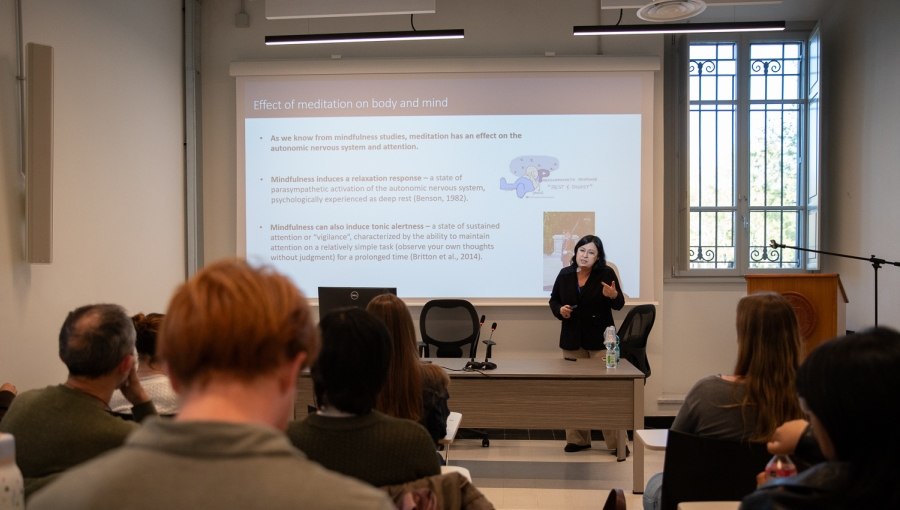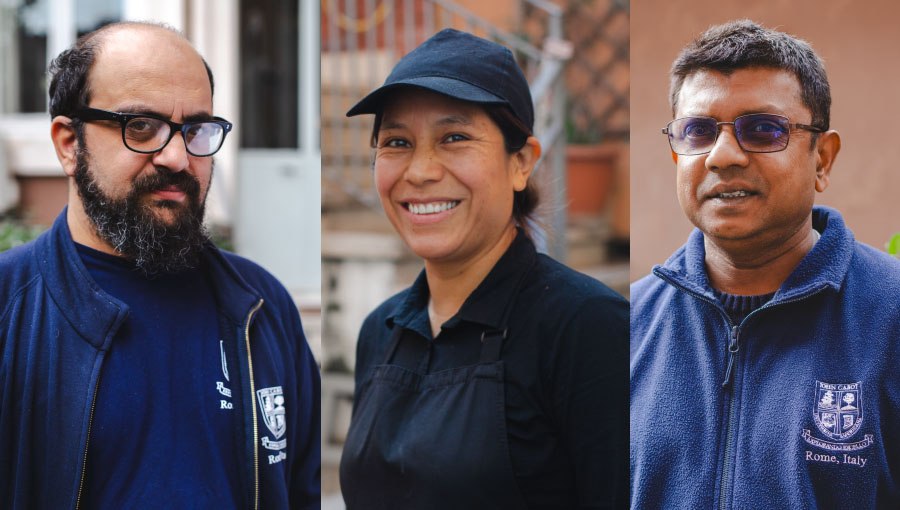Finding Your Why: Professor Thomas Hope
Born in London, Professor Thomas Hope joined JCU’s Department of Psychological and Social Sciences in 2023. He has a B.A. in Psychology, Philosophy, and Physiology from the University of Oxford, a Graduate Diploma in Law City University London, an M.Sc. in Evolutionary Robotics from the University of Sussex, and a Ph.D. in Cognitive Science from the University of Padova. Beyond his work in academia and research, he has been a tech entrepreneur and a management consultant, and he still takes occasional work as a technical consultant on A.I. projects. He’s also a trained barrister: a lawyer specializing in oral advocacy in the courts of England and Wales.
What brought you to JCU?
I came to Italy with my family since my wife and I were both keen to give our kids the experience of living in Rome. My father was a Professor of Italian Renaissance art history, so I was somewhat familiar both with Italy and Rome, having spent time here as a child. And I was based in Padova for most of my Ph.D., so the move wasn’t too much of a leap into the unknown for me.

How did you become interested in studying the brain?
I developed that interest at school, once I understood how little we collectively know about the brain. I consider a lot of what I’ve done as being dimensions of my personal study of intelligence. For example, as an undergraduate student of philosophy, I was mostly interested in the philosophies of science, psychology, and mind. It felt to me that the best way to start thinking about these issues was to have people teach me how to think more clearly, which I believe my professors did. My later studies and work in the field of artificial intelligence were – to me – just extensions of that philosophical enquiry: philosophy of mind with a screwdriver, one might call it. And I think of empirical psychology and neuroscience as further extensions, using different tools but still with a similar basic motivation.
Much of your current research involves developing new applications of machine learning for neurology. Tell us more about this.
I got into neurology because I was interested in the neurobiology of language – how the brain implements language functions. One good way to study this is by studying language impairments (aphasia) consequent to abrupt brain damage. By relating the damage to the symptoms, one can infer the function of the damaged brain regions before that damage occurred. Once one starts to look at patients, it rapidly becomes clear that there is “low-hanging fruit” that might improve their medical treatment even if it doesn’t directly address my more theoretical interests. I take the view that we have an obligation to pursue that kind of benefit, and machine learning is a potentially powerful way to do that. Generally, medicine is about groups. If you want to test a drug or other treatment, you divide your patients into a treatment group and a control group, and measure whether the former has better outcomes than the latter. This same logic has driven the medicine for brain disorders too, for decades. But these groups are never homogenous: there are always differences between patients within each group that cannot be controlled. And this is perhaps even more important for brain disorders than other areas of medicine because the consequences of brain damage depend on where it occurs, and different patients have damage in different locations. To me, it seems obvious that we should not treat these patients as homogenous groups when measuring the effectiveness of treatments or other interventions. So, I use machine learning to associate their responses to those interventions with the details of where and how much brain damage they have suffered. My results so far have been promising enough that I feel this direction of research is worth pursuing further, with the aim of developing more individually specific treatments for patients with brain damage.
What other projects are you currently working on?
Many projects! Probably too many; as one gets older, it becomes ever more important to prioritize. I have one line of research on prognosis prediction for stroke patients irrespective of treatment. A second line is more about brain imaging of the undamaged brain, to try to understand how the brain implements core language functions. A third line sits at the intersection between the neuroscience of language and artificial intelligence. In this domain, I seek ways to either use A.I. to better understand the algorithms implemented by our brains, or to use our evolving understanding of the brain to improve A.I. All of these lines can intersect, of course. But I also occasionally do other kinds of work when the mood takes me. For example, my most recent paper, which is currently under review, is more about basic statistical methodology than about any single phenomenon that one might use those methods to study. Again, this might be a function of getting older: more and more, I just want to be sure that my results really mean what I think they mean, which naturally encourages more of a focus on basic methodology.
What is your teaching philosophy and what would you like students to take away from your classes? What have you learned from your experience as a professor?
My teaching philosophy is to emphasize teleology: i.e., I focus less on exactly what has been done, and more on why it has been done. This is principally because I myself struggled to really understand my own field until I got the ‘why.’ And of course, the ‘why’ is not just about what others have done; it’s also about why I do what I do, and why my students should consider further study of the brain. Professionally, science is really all about the motivations you bring to it, and psychology makes that even more extreme, because different branches of the field can have comparatively little in common. For example, clinical psychology is (or can be) exclusively about helping people, and in that context, it might not really matter how the brain works. By contrast, my own field of cognitive neuroscience is mainly concerned with how the brain works, and in that context, clinical case studies could be treated more as data points than as people wanting / needing help. I believe that my motivations sit somewhere in between those extremes, but it’s a personal choice that one must make.
I guess the key thing that I’ve learned as a professor here at JCU is to adapt my teaching style to the background knowledge of my students. Rather than just telling students things that I know, and they don’t, I also try to guide them towards activities that help them to take more ownership of their learning. It’s a work in progress: I’m not sure I’m quite there yet, but I’m trying!
What advice would you give to students studying psychology and who wish to pursue a career in research?
I think the key bit of advice is that you’ve got to decide if you really want it, and why. I would advise that students who are interested in research should decide what they want to know more about, and why, and then examine what they need to know to make that contribution. If they have the drive to do it, I believe they will also be able to pick up the necessary methods. That said, I would also strongly suggest that students go into the field with their eyes wide open to the practical realities of an academic career. It is not an easy profession to work in. I remember giving a talk to school kids in Brixton, where I lived before I came to Rome, and they were baffled that I could accept – even be happy with – a job like mine after devoting so much time to formal education. I am happy with it because it is my vocation. If there’s a chance that it could be one of my students’ vocations too, then it’s definitely worth doing – because if your job is your vocation, it’s not really “work” at all in the normal sense. But if it’s just a job to you, then perhaps there are better jobs: again, it all comes down to why we do what we do.





